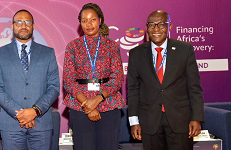Experts from different African countries gathered in Angola exchange of ideas and experiences on the actual and potential impacts of the Russia-Ukraine crisis on African economies.
The ECA Sub-Regional Office for Southern (SRO-SA) in collaboration with the Angolan Government and the United Nations Resident Coordinator’s Office in Angola held a side event at the margins of the 54th session of the ECA Conference of African Ministers of Finance, Planning and Economic Development to offer African countries a platform for dialogue.
The side event aimed to stimulate reflection on the impact of the crisis on the sustainable development of African economies, share experiences and perspectives on how to mobilise resources to counter the shocks of COVID-19 and Ukraine Crisis.
SRO-SA Director, Eunice G. Kamwendo, noted that African countries are most affected by the pandemic and the combined impact of the COVID-19 and the Ukraine crisis are likely to further aggravate liquidity issues constraining recovery. She reminded that as a region Southern Africa contracted the most out of all the sub-regions in Africa due to Covid-19.
“According to estimates by the African Development Bank (AfDB) the region’s GDP contracted by as much as 6.3% in 2020, compared to a 2.1% recession for the rest of Africa,” said Ms Kamwendo.
She pointed out that Africa faces a high risk of food insecurity because Russia and Ukraine are major global suppliers of agricultural commodities such as maize, wheat, oils and fertilizers. “The two countries, combined, provide 30 per cent of the world’s wheat and barley needs; supply nearly one-fifth of maize globally, and account for over half of the global market share in sunflower oil, among other commodities.”
The United Nations Resident Coordinator, Zahira Virani added that the war in Ukraine is forcing Africa to revisit its strategies. “Angola is leading the side event because Angola is in a unique position of facing adverse impacts and opportunities at the same time”. She said the African Continental Free Trade Area provided a great opportunity for intra trade and new markets for the country.
Angola Minister of Economy and Planning, Mario Augusto Caetano Joao, informed the meeting that to counter shocks Angola has engaged deep reforms and changed its business model by prioritizing local production and diversifying from focus on oil production to heavy investments in agri business, fisheries, and transport to give the country a comparative advantage.
“Ten years ago, Angola’s oil dependence was 43% and now oil dependency is only 20% showing that the investments are bearing fruit and the country’s economy has stabilized despite the crisis”.
Southern Africa participants benefited from the exchange of experiences from East Africa. Hon. Amos Lugoloobi, Uganda Minister of State for Finance, Planning and Economic Development encouraged Southern African countries to increase local food production to prevent the dependency on wheat. He gave an example of his country which has increased the production of its staple food and products such as bananas, maize, cassava, palm trees and potatoes.
Mr Lugoloobi noted that Uganda is a net producer of its food supplies and export to neighbouring countries. The country has also embarked on increasing the production of sunflower oil to counter rising prices and be self-sufficient and able to face shocks.
On policy responses to the Ukraine crisis and COVID-19 pandemic, the meeting listened to three other presenters: Dr. Yamungu Kayandabila the Deputy Governor of the Central Bank of Tanzania; Mr. Marcos Souto, IMF Country Director in Angola, Dr Eklou Attiogbevi-Somado, Manager for Agriculture and Agro-Industry for West Africa, African Development Bank and Mr. Mtho Xulu, President of South African Chamber of Commerce and Industry.
The meeting, moderated by Joseph Atta-Mensah from ECA’s Macroeconomics and Governance Division, closed with an interactive Question and Answer session involving the panelists, journalists, and representatives of member States African member States, who reiterated to ECA the importance of the annual Conference of African Ministers of Finance, Planning and Economic Development (CoM) as a platform that allows stakeholders to debate key issues of relevance to Africa’s development.

